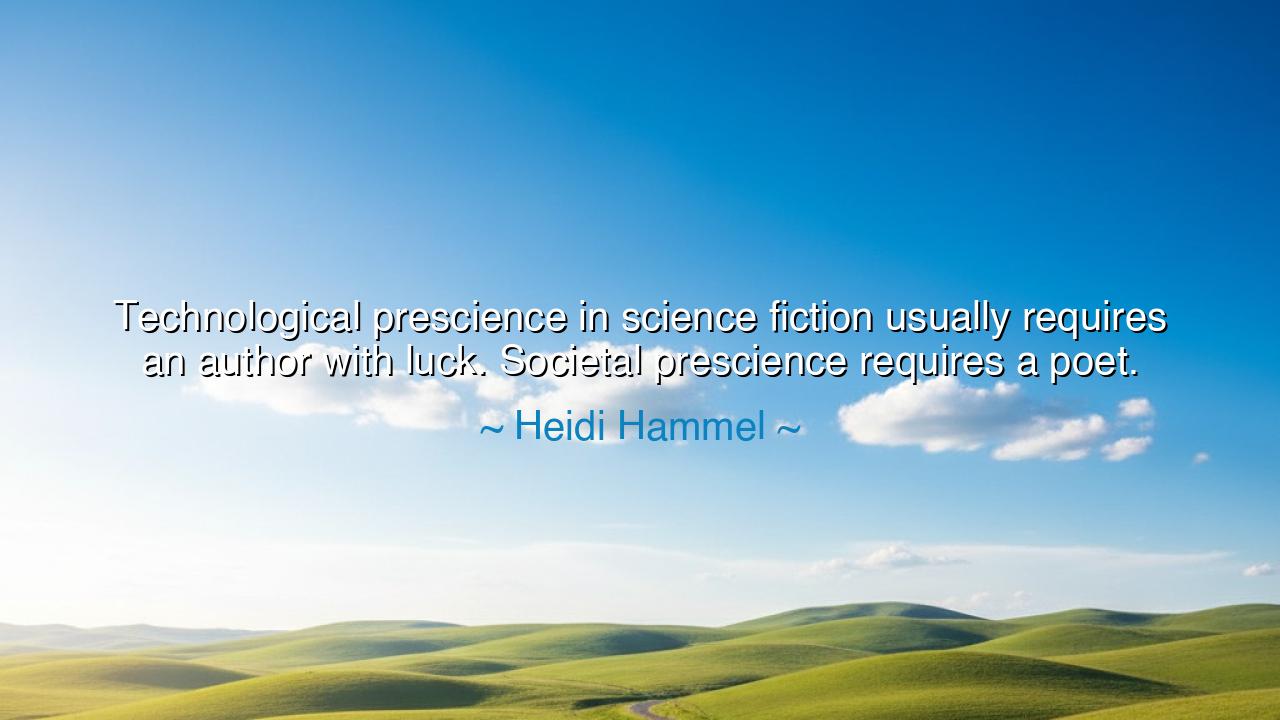
Technological prescience in science fiction usually requires an
Technological prescience in science fiction usually requires an author with luck. Societal prescience requires a poet.






Hear this, O children of time, for the wisdom of Heidi Hammel rings through the ages like a bell calling the lost to the shores of truth. She speaks thus: "Technological prescience in science fiction usually requires an author with luck. Societal prescience requires a poet." In these words, she divides the realms of insight into two vast domains: the world of machines and inventions, and the world of human hearts and minds. To foresee the machines of tomorrow, to imagine the technologies that will shape the future, one must be a clever observer of the present, blessed with a bit of fortune—for the world of technology is ever-changing, and no man can predict the exact path it will take. But to see into the depths of society, to understand the currents of human emotion, and to foresee the changes that will sweep across the generations, that is a task that belongs to the poet, to the one who can look beyond the veil of time and see the very soul of humanity.
To understand the meaning of these words, let us first consider the nature of technology. Technological prescience, as Hammel suggests, is often a matter of seeing the trends of the present and predicting what might emerge from them. The machine is an extension of our ingenuity, a reflection of the practical minds that shape our world. When Jules Verne, that master of imagination, wrote of submarines and space travel, he did not foresee the precise shape of the technologies to come, but he sensed the potential of the human mind to reach beyond the horizon. His writings were not filled with the precise blueprints of modern technology, but with the spirit of human innovation. He was fortunate to see what others could not, but even he could not predict the intricate details of the world that would emerge.
Yet, when we turn to the realm of society, the task becomes far more complex. Societal prescience, the ability to understand and predict the shifting tides of human culture, requires a different kind of vision—a vision not of invention, but of human nature itself. The poet is the one who sees the undercurrents that shape the course of civilizations, the one who can glimpse the passions, fears, and desires that will bring about change. Think of the great William Shakespeare, who, through his timeless plays, painted not just the actions of kings and queens, but the human soul in all its complexity. His words transcended the limits of his time and gave voice to the struggles of men and women, to the forces of love, jealousy, ambition, and betrayal that continue to shape the world. Shakespeare did not predict the technological advances of the future, but he understood the essence of humanity, and in this, he was a prophet.
Heidi Hammel’s words are a reminder that society is not simply a collection of machines and inventions, but a living, breathing entity shaped by the hearts and minds of its people. Societal prescience, then, belongs to those who understand the deep, eternal truths of human nature—those who can see beyond the surface of events and grasp the forces that drive us. It is the poet who sees the world not just as it is, but as it could be. In the words of the great philosopher Plato, it is the poet who speaks of the Ideal, the world of forms that lies beyond the physical and the fleeting. A poet does not simply predict the future; they shape it with the power of words, with the ability to stir the hearts of those who read their works and to awaken in them the desire for something greater.
Consider the great George Orwell, whose prophetic novel 1984 foretold a world of surveillance and totalitarian control long before the technological age brought such visions into reality. Orwell did not predict the exact technologies that would come, but he understood the societal forces that would lead to them. His genius lay in his ability to see the patterns of human behavior, to understand how power and control could be wielded, and to warn of the dangers that lay ahead. Like the poet, he did not seek to invent the machines of the future, but to understand the human condition, and in doing so, he foresaw the world we are now struggling to navigate.
Thus, the lesson that Heidi Hammel imparts is one of balance. Technology is a force that moves forward with swift progress, often driven by the ingenuity and luck of those who dare to dream. But society, with all its complexity and depth, requires a more thoughtful and empathetic vision. The technological mind builds the machines that will shape our future, but it is the poet who sees the world in all its depths—the poet who, by understanding the human heart, can guide us through the storm of progress. As we move forward into the future, let us not forget the importance of both: the innovator who shapes the tools, and the poet who shapes the soul.
Take heed, then, O children of the future, for in your hands lies the power to shape both the machines of tomorrow and the society in which they will operate. Let your curiosity lead you to understand both the mechanical and the human, for in the marriage of these two realms, true progress will be found. Let us honor both the scientific mind and the artistic soul, for in the balance of these two forces lies the key to a future where technology serves not just the needs of the body, but the needs of the spirit as well.






AAdministratorAdministrator
Welcome, honored guests. Please leave a comment, we will respond soon